There are a lot of myths out there about running shoes. One of the most common is that you can’t run in hiking shoes. This is simply not true! In fact, hiking shoes can be some of the best running shoes around. They are sturdy and provide great support, which is exactly what you need when you’re running long distances. If you’re looking for a new pair of running shoes, consider picking up a pair of hiking shoes instead!
What Are Hiking Shoes?
Hiking shoes are a type of footwear designed for use while walking or hiking on trails. They usually have a tough, water-resistant upper and a lugged sole that provides good traction. Some hiking shoes also have a Gore-Tex or other waterproof/breathable membrane to keep your feet dry in wet conditions. [1]
Is It Okay To Run In Hiking Boots?
In short, yes you can. Hiking shoes are designed to provide good traction and support while walking on trails, so they will work just fine for running on trails as well. Although you can use hiking shoes for running, there are a few factors to consider before doing so.
First, hiking shoes tend to be heavier than running shoes. This is because they need to be durable enough to withstand the wear and tear of walking on rough terrain. They also have a thicker sole that provides more cushioning and support, which can make them feel slower and less responsive when running.
Second, hiking shoes are not as breathable as running shoes. This means that your feet will likely get hotter and sweatier when running in hiking shoes, which can lead to blisters.
Finally, keep in mind that not all hiking shoes are created equal. Some are better suited for running than others. If you’re serious about using your hikes as a chance to get some extra miles in, make sure you choose a pair of hiking shoes that have good traction and are lightweight and breathable. [2]
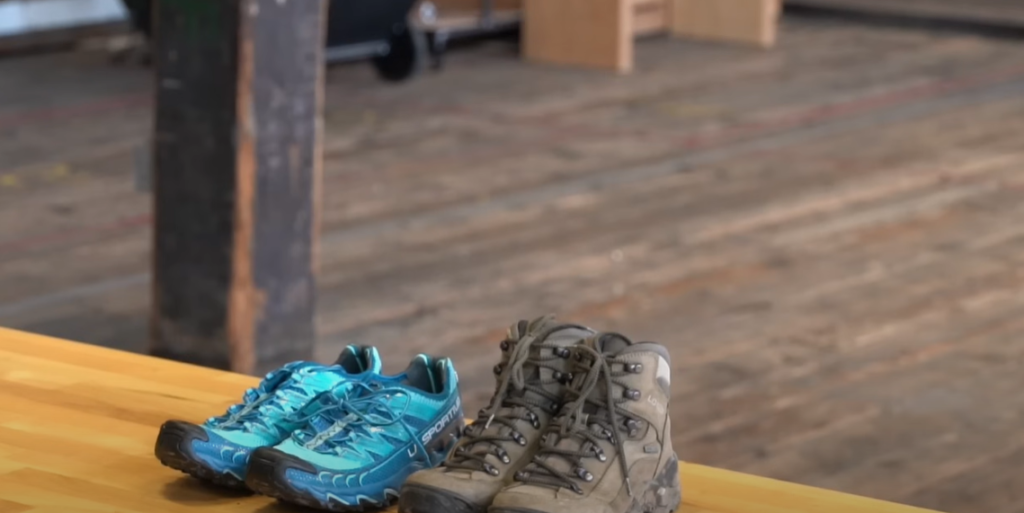
Types Of Hiking Shoes
There are different types of hiking shoes available in the market, each designed for a specific purpose. While some hikers might prefer a certain type of shoe, it really depends on your own personal preferences.
The three main types of hiking shoes are:
- Trail running shoes – these are designed for running on trails and provide good grip and stability. They are usually lighter than other types of hiking shoes and have less cushioning. [3]
- Hiking boots – these offer more support and stability than trail running shoes, and are ideal for longer hikes or when carrying a heavy backpack. They can be heavier and more uncomfortable than other types of hiking shoes, but they will protect your feet from rocks and roots.
- Waterproof hiking shoes – these are designed to keep your feet dry in wet conditions and are ideal for hikes in the rain or across streams. They can be more expensive than other types of hiking shoes and may not be as breathable, but they will keep your feet dry.
Things To Consider
Weight
The first thing you’ll want to consider when deciding whether or not to run in your hiking shoes is the weight of the shoe. Hiking shoes are designed to be durable and supportive, which often means they’re on the heavier side. If you’re used to running in lighter, more minimalist shoes, then you might find that running in a hiking shoe feels slower and more cumbersome. On the other hand, if you don’t mind a little extra weight on your feet, then the added support and durability of a hiking shoe could be just what you need. Ultimately, it’s up to you to decide whether the extra weight is worth the added benefits.
Tread
Another important factor to consider is the tread on your hiking shoes. If you’re planning on running on trails, then you’ll want a shoe with a grippy tread that can handle uneven and slippery surfaces. On the other hand, if you’re mostly running on pavement or other smooth surfaces, then you might be able to get away with a less aggressive tread.
Materials
The materials of your hiking shoes can also affect how they feel when you’re running. Shoes with a lot of padding and support might feel great for walking, but they can be too bulky and constricting for running. On the other hand, shoes made with more breathable and flexible materials might not offer as much support, but they’ll be much easier to run in.
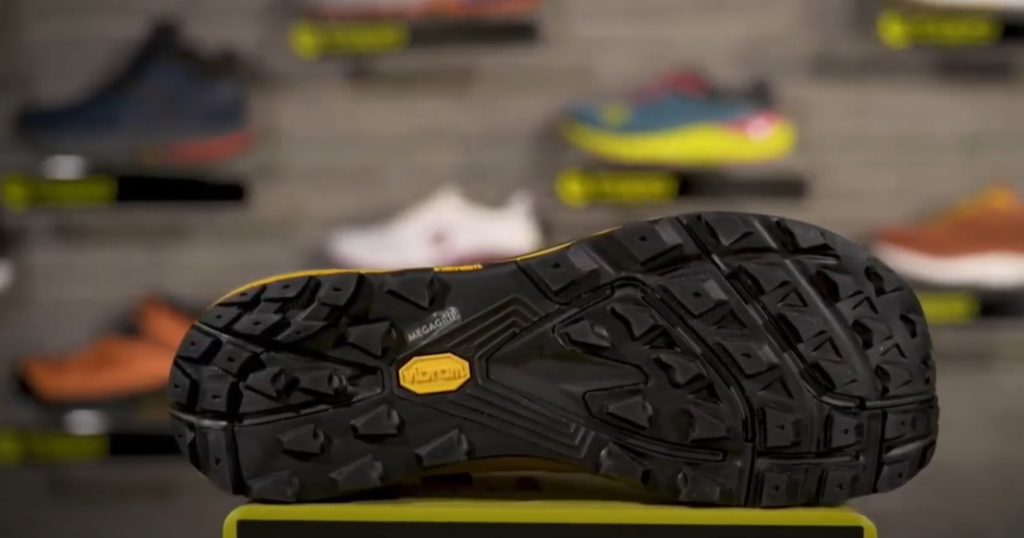
Stiffness
The stiffness of the sole on your hiking shoes can also affect how they feel when you’re running. A stiffer sole will provide more support and stability, but it can also be more difficult to run in. A softer sole will be more flexible and easier to run in, but it might not offer as much support. [4]
Water Resistance
If you’re planning on running in wet conditions, then you’ll want a shoe that has some water resistance. This will help to keep your feet dry and comfortable, even when they’re getting wet. Ultimately, it’s up to you to decide whether or not running in your hiking shoes is the right choice for you.
Climate
The climate you’ll be running in can also affect your decision. If you live in an area with a lot of rain or snow, then you might need a shoe that has more water resistance. On the other hand, if you live in a dry climate, then you might be able to get away with a less water resistant shoe.
Flexibility
The flexibility of your hiking shoes can also affect how they feel when you’re running. A more flexible shoe will be easier to run in, but it might not offer as much support. A less flexible shoe will provide more support, but it can be more difficult to run in.
Durability
Finally, you’ll want to consider how durable your hiking shoes are. If you’re planning on using them for both running and hiking, then you’ll need a shoe that can stand up to the wear and tear of both activities. However, if you only need a shoe for running, then you might be able to get away with something less durable.
What About Approach Shoes?
Approach shoes are another type of footwear that lies somewhere between running shoes and hiking boots on the spectrum of stiffness. These shoes are designed for climbers who need to hike to the base of a climb, but also want a shoe that will perform well on technical terrain.
So if you’re wondering whether you can run in approach shoes, the answer is yes…to a certain extent. Approach shoes aren’t meant for long-distance running, but they can handle short bursts of speed or uphill running on trails. Just don’t expect them to provide the same level of cushioning and support as running shoes, and be prepared for your feet to feel a bit more tired at the end of your run. [5]

When To Wear Hiking Shoes?
Wearing the right shoes while hiking is important. Hiking shoes are designed to protect your feet and provide traction on slippery or uneven surfaces. They also help to support your ankles and prevent fatigue.
Some people choose to wear running shoes while hiking, but this is not always the best option. Running shoes are not as durable as hiking shoes, and they may not provide enough support on rough terrain. In addition, running shoes can be uncomfortable when walking for long periods of time.
If you decide to wear running shoes while hiking, make sure to break them in before hitting the trail. Wear them around the house or on short walks to get a feel for how they will work during a longer hike. Be prepared for blisters and hot spots, and bring extra socks just in case.
In general, it is best to wear hiking shoes while hiking. They are designed for the activity and will provide the most support and protection for your feet. However, if you do choose to wear running shoes, make sure to break them in first and be prepared for some discomfort along the way.
When To Wear Trail Running Shoes?
The debate of whether it is better to run in shoes designed specifically for running or in hiking shoes has been around for a while. Some say that running shoes are too flimsy and do not provide enough support, while others find them constricting and prefer the freedom of movement that hiking shoes allow.
So, which is the right choice for you?
It really depends on your personal preferences and the type of terrain you will be running on. If you plan on doing mostly road running, then a pair of trail running shoes may not be necessary. However, if you often find yourself running on trails or uneven surfaces, then a sturdier shoe with more support may be a better option.
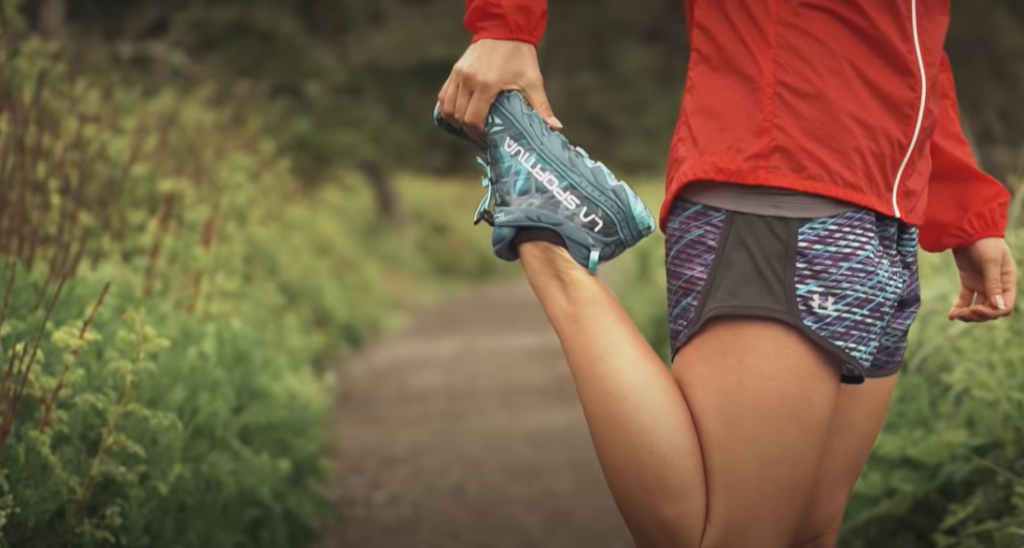
How To Choose Trail Running Shoes For Hiking?
Traction
Look for shoes with good traction that can grip the ground well. This is especially important if you’ll be running on uneven or slippery surfaces.
Support
Make sure the shoes provide enough support for your feet and ankles, especially if you have any existing injuries or problems.
Breathability
Choose shoes that are breathable to help keep your feet cool and dry, even during long runs.
Comfort
Remember that you’ll be spending a lot of time in these shoes, so make sure they’re comfortable to wear for extended periods of time.
Fit
Make sure the shoes fit well and provide enough room for your feet to breathe. Also, be sure to break in the shoes before you go on a long run.
Cushioning
Look for shoes with good cushioning to help absorb the impact of your feet hitting the ground.
Materials
Choose shoes made from durable materials that can withstand the elements and rough terrain.
Hiking Boots vs. Trail Running Shoes
While there are a few different types of running shoes, they all have one main purpose: to provide cushioning and support for your feet while you run. This might make you think that they wouldn’t be ideal for hiking, which often involves walking on uneven terrain.
Of course, there are also a few reasons why you might want to stick with hiking boots. They usually have more robust soles that can provide better traction and support on rough terrain. And they’re typically waterproof, which can come in handy if you encounter any streams or puddles along the trail.
So, which is better for hiking: boots or running shoes? Ultimately, it comes down to personal preference. Some hikers prefer the lighter weight and breathability of running shoes, while others find that hiking boots offer more support and protection. Whichever you choose, make sure to break them in before hitting the trail so you don’t end up with any blisters.
How to Clean Hiking Shoes?
It is essential to clean your hiking shoes after every use, especially if you have been walking in wet or muddy conditions. This will prevent the build-up of dirt and grime, which can damage the fabric and make the shoes less comfortable to wear.
To clean your hiking shoes, start by removing the laces and insole, if possible. Next, use a soft brush or cloth to remove any dirt or debris from the surface of the shoe. If the shoes are particularly dirty, you can pre-treat them with a stain remover before brushing.
Once the surface of the shoe is clean, turn it upside down and tap it gently on the ground to loosen any dirt that may be trapped in the tread. Finally, wash the shoes in a mild soap and water solution, then allow them to air dry. [6]
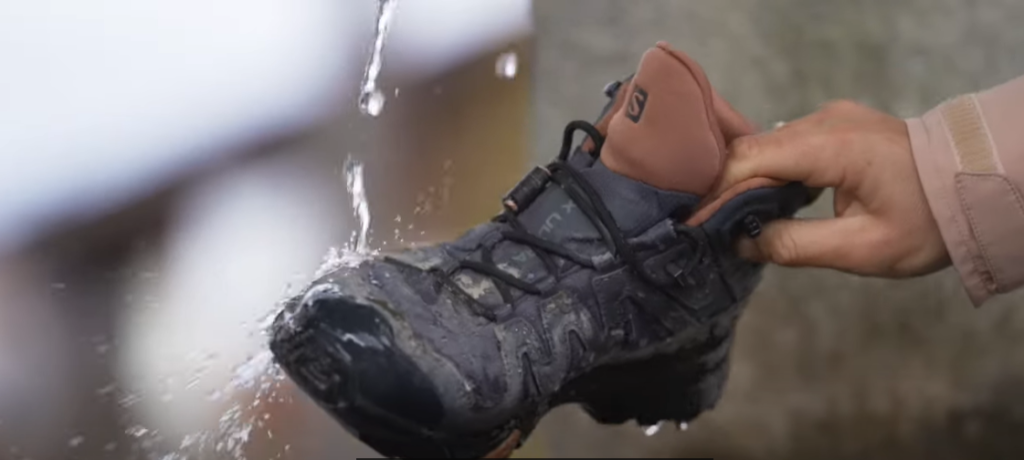
How to Store Hiking Shoes?
It is best to store your hiking shoes in a cool, dry place. You can also store them in a shoe bag or box to keep them clean and protected. If you are not planning on using your shoes for a while, it is best to treat them with a waterproofing spray before storing them. This will help keep your shoes in good condition and prevent them from getting damaged while in storage.
FAQ
Are running and hiking shoes the same?
No, running and hiking shoes are not the same. Running shoes are designed for running, and hiking shoes are designed for hiking. While you can technically run in hiking shoes, it is not recommended, as they are not designed for the impact of running and could cause injuries.
What are the differences between running shoes and hiking shoes?
There are several key differences between running shoes and hiking shoes:
- Running shoes have more cushioning to protect your feet from the impact of running, while hiking shoes have less cushioning to allow your feet to feel the ground more.
- Running shoes have a narrower heel to keep your foot from sliding around, while hiking shoes have a wider heel for stability on uneven terrain.
- Running shoes have a smoother sole to make running shoes have a more flexible sole to provide better traction on uneven surfaces.
Can you run in Salomon hiking shoes?
Yes, you can run in Salomon hiking shoes. However, they are not designed for running and are not as comfortable or efficient as running shoes. If you do choose to run in Salomon hiking shoes, be aware that they may cause injuries and are not as effective as running shoes.
Can hiking shoes be used as walking shoes?
Yes, hiking shoes can be used as walking shoes. They are designed for both activities and provide good support and traction for walking. However, they may not be as comfortable as walking shoes that are specifically designed for walking.
Do I need different shoes for different types of hiking?
Yes, you may need different shoes depending on the type of hiking you plan to do. For example, if you plan to hike in the mountains, you will need a shoe with more support and stability than if you were just hiking on a trail.
Do hiking shoes last longer than running?
Yes, hiking shoes typically last longer than running shoes. This is because they are designed for durability and stability, rather than speed and cushioning.
What are some good brands of hiking shoes?
Some good brands of hiking shoes include Salomon, Merrell, and Columbia.
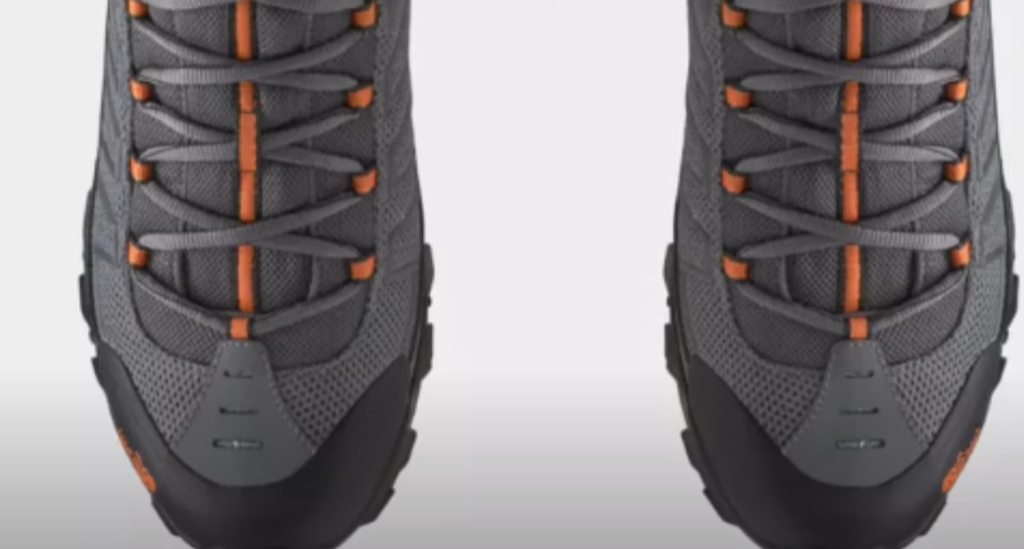
How to maintain hiking shoes?
Wash your shoes after every hike using a mild soap and water solution. Be sure to rinse them well. You can also use a shoe brush or old toothbrush to help remove any caked on dirt or mud. Let your shoes air dry away from direct sunlight or heat sources. Once they are dry, you can apply a waterproofing treatment if desired. This will help to keep your shoes in good condition and protect them from the elements. After each hike, check your shoes for any wear and tear. Look for cracks in the leather, loose stitching, or holes in the fabric. If you see any damage, be sure to repair it as soon as possible to prevent further damage. Hiking shoes are a vital piece of gear for any hiker, and taking care of them will help ensure that they last for many hikes to come.
Where can I buy hiking shoes?
You can purchase hiking shoes at most outdoor retailers, as well as some sporting goods stores. Be sure to try on several different pairs to find the perfect fit for your feet.
What are the benefits of running in hiking shoes?
There are several benefits to running in hiking shoes, including the added support and stability that they provide. Hiking shoes also have a more rugged sole which can help protect your feet from sharp objects or uneven terrain.
Do I need to break in my hiking shoes?
Yes, you will need to break in your hiking shoes before you hike in them. This means wearing them around the house and on short walks or hikes to get them comfortable.
How often should I replace my hiking shoes?
You should replace your hiking shoes every 300-500 miles, or every 6 months to a year, depending on how often you hike.
Can you wear trail running shoes everyday?
Yes, you can definitely wear trail running shoes everyday! In fact, many people do just that. Trail running shoes are designed to be versatile and comfortable enough to handle all sorts of activities, from hiking to walking to running. So if you’re looking for a shoe that can do it all, a trail running shoe is a great option. Of course, there are a few things to keep in mind if you’re going to be wearing your trail running shoes every day. First, they may not last as long as a dedicated pair of running shoes if you’re using them for both activities on a regular basis. Second, you’ll want to make sure you’re getting the right size and fit for your feet, as ill-fitting shoes can cause a variety of problems. But if you take these things into consideration, you’ll be able to enjoy the comfort and versatility of trail running shoes for all your everyday activities.
Useful Video: Can You Wear Hiking Shoes Everyday
Conclusion
So, can you run in hiking shoes? The answer is yes, but it really depends on the shoe. Some are designed specifically for running and some are not. It also depends on your own personal preference. If you’re someone who likes to go fast and wants a shoe that will give you good traction and support, then a running shoe is probably a better choice. However, if you’re just looking for a comfortable shoe to hike in, then a hiking shoe will probably suffice. Just be sure to try them out before you buy to make sure they’re comfortable for you.
References:
-
- https://hikingguy.com/how-to-hike/hiking-boots-or-shoes-do-i-really-need-hiking-boots/
- https://www.thenorthface.co.uk/help/faq/can-you-run-in-hiking-boots.html
- https://www.runnersworld.com/gear/a22115120/best-trail-running-shoes/
- https://www.rei.com/learn/expert-advice/hiking-boots.html
- https://outdoorsmagic.com/article/best-approach-shoes/
- https://www.salomon.com/en-int/outdoor/outdoor-advice/how-clean-and-care-your-hiking-shoes



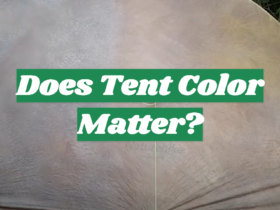
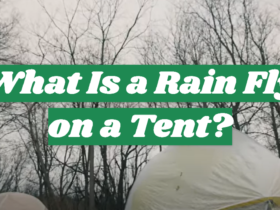





Leave a Review